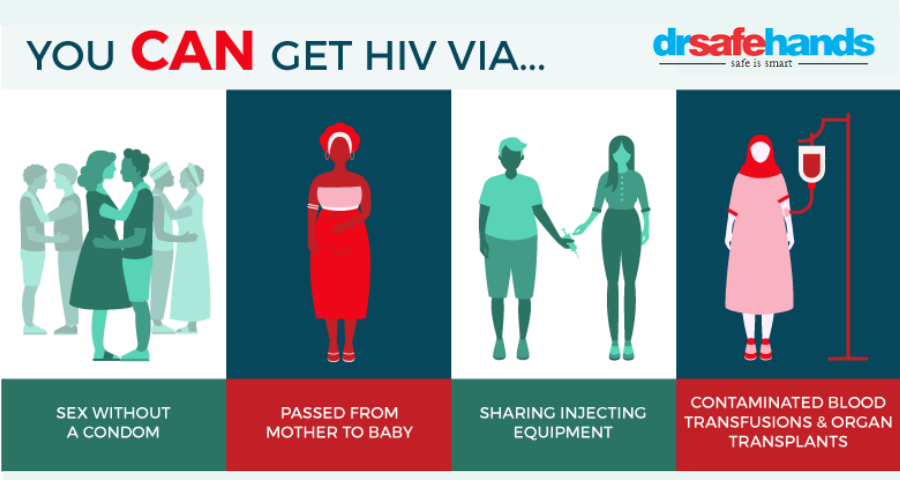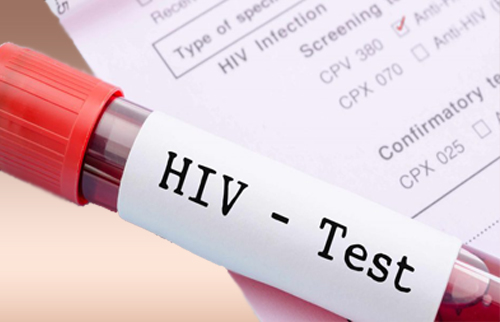
Direct go to
What is HIV?
HIV (Human Immunodeficiency Virus) is an immunodeficiency virus that causes Acquired Immunodeficiency Syndrome (AIDS) and affects the immune system. It is a disease that, in most cases, affects young adults and children.
Transmission of HIV can be of three types:
- Parenteral transmission
- Sexual transmission
- Vertical transmission

Symptoms of HIV
Initially, this condition presents with swollen lymph nodes and flu-like symptoms. On the other hand, more severe symptoms can appear months or even years after contracting the disease.
After an incubation period that can extend from 2 to 4 weeks, symptoms (often characterizing the flu or the pathology of mononucleosis), for about a month, of an acute retroviral syndrome may occur. These are:
Sore throat or pharyngitis, Myalgia (body aches), General malaise, Fever, Enlarged lymph nodes, Skin rash, Appearance of canker sores in the mouth or genital area, Diarrhea.
HIV diagnosis
HIV is diagnosed through blood tests and, although there are no effective treatments or vaccines yet, it is possible to prevent infection with some precautions.
What are the causes of HIV?
The leading cause of HIV transmission is determined by unprotected intercourse. HIV is transmitted through direct contact with the blood or body fluids of an infected person, through the exchange of syringes between drug addicts, or through the use of infected tools or needles (injecting transmission). Transmission can occur with sexual intercourse through the virus contained in the seminal fluid. This risk could increase if trauma or lacerations of the mucous membranes are caused during intercourse, which causes blood to leak (sexually transmitted).
Additional risk factors are represented by the presence of pathologies that can be sexually transmitted:
Syphilis, Gonorrhea, Genital herpes
Even a newborn can contract HIV if the mother is infected. The infection can be transmitted from a pregnant woman through the blood that reaches the fetus, during childbirth, due to blood and vaginal secretions, or during the time of breastfeeding, since the virus is contained in breast milk (vertical transmission).
Treatment of HIV
HIV-specific testing is the only way to detect infection; Unfortunately, no test can highlight the virus immediately after illness. The speed with which the condition is highlighted depends on several factors, including the type of test used. This also determines the maximum time when the certainty is acquired that a test result is negative (window period).
Search for specific antibodies in the blood
There are various types of blood tests commonly used for the diagnosis of HIV, which give specific answers after different times from the last risk behavior: combined tests (4th generation tests) – search for anti-HIV antibodies produced by the individual and parts of the virus, such as the p24 antigen. They can highlight the infection already after 20 days.
The window period is 40 days from the last risky behavior.
Tests that search only for anti-HIV antibodies (3rd generation test) – can highlight the infection already after 3-4 weeks.
The window period is 90 days from the last risky behavior.
It is not necessary to be fasting to undergo an HIV blood test. If the test is performed with a blood sample sent to the laboratory, the result is available on average in three days.

Rapid blood and saliva tests
For diagnosis, rapid tests are also available to be performed on saliva or on a drop of blood on the finger (including the HIV infection self-diagnosis test, which can be purchased at a pharmacy). The quick test result is available in minutes. As they are the first screening tests, confirmation with blood sampling is required in case of a doubtful or reactive (positive) result. To know the window period of the product used, refer to the manufacturer’s instructions. If they are combined tests, the window period will be 40 days; if they are looking for antibodies, only the window period will be 90 days.
